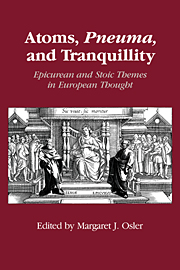Book contents
- Frontmatter
- Contents
- List of contributors
- Acknowledgments
- Introduction
- 1 Ethics and logic in Stoicism
- 2 Medieval connectives, Hellenistic connections: the strange case of propositional logic
- 3 Stoic psychotherapy in the Middle Ages and Renaissance: Petrarch's De remediis
- 4 Alonso de Cartagena and John Calvin as interpreters of Seneca's De clementia
- 5 The Epicurean in Lorenzo Valla's On Pleasure
- 6 Seneca's role in popularizing Epicurus in the sixteenth century
- 7 Stoic contributions to early modern science
- 8 Fortune, fate, and divination: Gassendi's voluntarist theology and the baptism of Epicureanism
- 9 Epicureanism and the creation of a privatist ethic in early seventeenth-century France
- 10 Robert Boyle on Epicurean atheism and atomism
- 11 Stoic and Epicurean doctrines in Newton's system of the world
- 12 Locke, Willis, and the seventeenth-century Epicurean soul
- 13 The Epicurean new way of ideas: Gassendi, Locke, and Berkeley
- 14 The Stoic legacy in the early Scottish Enlightenment
- Index
11 - Stoic and Epicurean doctrines in Newton's system of the world
Published online by Cambridge University Press: 13 November 2009
- Frontmatter
- Contents
- List of contributors
- Acknowledgments
- Introduction
- 1 Ethics and logic in Stoicism
- 2 Medieval connectives, Hellenistic connections: the strange case of propositional logic
- 3 Stoic psychotherapy in the Middle Ages and Renaissance: Petrarch's De remediis
- 4 Alonso de Cartagena and John Calvin as interpreters of Seneca's De clementia
- 5 The Epicurean in Lorenzo Valla's On Pleasure
- 6 Seneca's role in popularizing Epicurus in the sixteenth century
- 7 Stoic contributions to early modern science
- 8 Fortune, fate, and divination: Gassendi's voluntarist theology and the baptism of Epicureanism
- 9 Epicureanism and the creation of a privatist ethic in early seventeenth-century France
- 10 Robert Boyle on Epicurean atheism and atomism
- 11 Stoic and Epicurean doctrines in Newton's system of the world
- 12 Locke, Willis, and the seventeenth-century Epicurean soul
- 13 The Epicurean new way of ideas: Gassendi, Locke, and Berkeley
- 14 The Stoic legacy in the early Scottish Enlightenment
- Index
Summary
INTRODUCTION
In the last edition of his Opticks Isaac Newton had this to say about the ultimate particles of matter. “It seems probable to me, that God in the Beginning form'd Matter in solid, massy, hard, impenetrable, moveable Particles, of such Sizes and Figures, and with such other Properties, and in such Proportion to Space, as most conduced to the End for which he formed them.” Newton also observed that the primitive particles never wear out or break, and their permanence guarantees that nature will be “lasting,” with the “Changes of corporeal Things … placed only in the various Separations and new Associations and Motions of these permanent Particles.”
Those phrases seem at first glance to place Newton firmly in the Epicurean camp – to align him fully with the doctrines of the ancient atomists, who argued for indestructible solid bodies, or atoms, that might vary in weight, shape, and size. But that simple view of Newton's position must rapidly be modified on four counts: the first, religious and theological; another, scientific; the next, historical; the last, philosophical. Although the four categories overlap to a certain extent, one may treat them separately for purposes of analysis, and in this chapter I shall argue that Newton accepted only a very incomplete and partial version of Epicureanism. Probably the most significant modifications of ancient atomism effected by Newton in his system of the world derived from Stoicism, and it will be profitable later to explore the tension and synthesis in Newton's thought between discreteness and continuity in the natural world: in other words, between the atomistic ideas of discrete particles in Epicureanism and the tonic continuum pervading the whole world in the Stoic pneuma.
- Type
- Chapter
- Information
- Atoms, Pneuma, and TranquillityEpicurean and Stoic Themes in European Thought, pp. 221 - 238Publisher: Cambridge University PressPrint publication year: 1991
- 4
- Cited by



